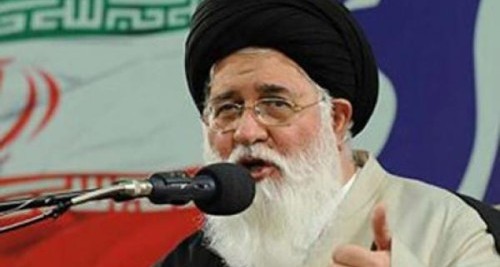PHOTO: Ayatollah Ahmad Alamolhoda, the Friday Prayer Leader of Mashhad
A leading cleric in Iran has challenged the July 14 nuclear deal with the 5+1 Powers, saying it violates the Supreme Leader’s requirements for Tehran’s interests.
Delivering the Friday Prayer in the northeastern city of Mashhad, Ayatollah Alamolhoda praised Iran’s negotiators but said, “Although [they] put a lot of effort into reaching this deal, unfortunately the agreement violates the red lines that the Supreme Leader has specified.”
The speech highlighted the continuing opposition by some hardliners to approval of the agreement. Critical MPs, many of them allied with former President Mahmoud Ahmadinejad, have demanded a vote rather than endorsement by the Supreme National Security Council. State broadcaster IRIB, which includes hardline officials from the Ahmadinejad Administration and linked to former nuclear negotiator Saeed Jalili, has also featured anti-deal statements.
Alamolhoda supported the call for a Parliamentary vote: “The representatives of Parliament must pay attention to the legal authority that the people have put in their hands….Parliament is responsible for accepting or rejecting the [agreement] and [the UN] Resolution.”
The Tehran Friday Prayer leader, Ayatollah Emami Kashani, did not make a direct challenge. Instead, he echoed this week’s wider criticism of the US over its regional approach — part of Iran’s political strategy over the Syrian crisis — saying that the West continues to charge Iran with building nuclear weapons while supporting terrorists and using the Islamic State as a “diversion”.
President Rouhani has been touring the country to promote the deal. On Thursday, he used the opposition of hardliners in the US and Israel to support his case:
After Iran and global powers reached an agreement known as the Vienna agreement, you see that the regime screaming in fear from dawn to dusk is the occupying Zionist regime of Israel. You see that the whole region, regional nations and the great Iranian nation are happy, but not Zionists and warmongers in America.
However, the challenge to the President was highlighted when an MP said that Speaker of Larijani Larijani supported the demand for the Majlis’ approval of the agreement “in the form of a bill.”
The MP, Mohammad Saqaei, said:
The government has undertaken certain commitments in the JCPOA [agreement]. This is a treaty and according to the constitution it must be sent to the Parliament in order to be passed….
In my opinion, the JCPOA must be sent to Parliament as a bill, and review and voting must take place.

